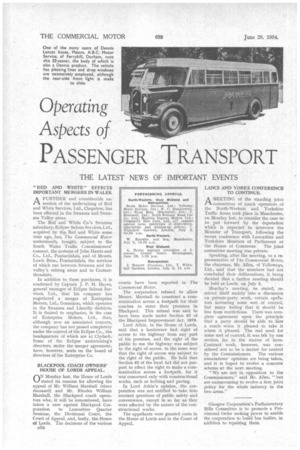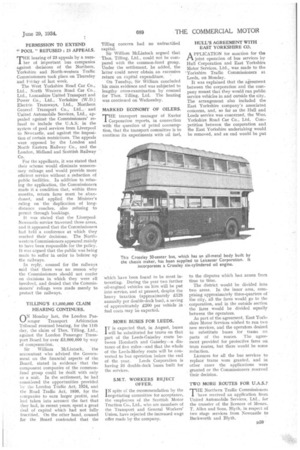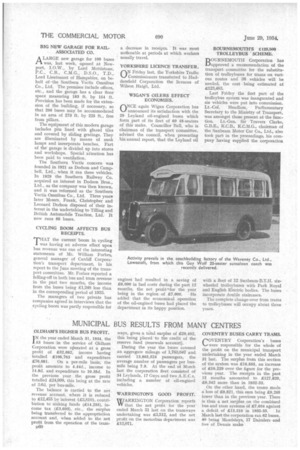PASSENGER TRANSPORT
Page 112

Page 113

Page 114

If you've noticed an error in this article please click here to report it so we can fix it.
THE LATEST NEWS OF IMPORTANT EVENTS
Operating Aspects of
" RED AND WHITE" EFFECTS IMPORTANT MERGERS IN WALES.
A FURTHER and considerable extension of the undertaking of Red and White Services, Ltd., Chepstow, has been effected in the Swansea and Swansea Valley areas.
The Red and White Co.'s Swansea subsidiary, Eclipse Saloon Services, Ltd., acquired by the Red and White some time ago, has, The Commercial Motor understands, bought, subject to the South Wales Traffic Commissioners' consent, the systems of John Harris and Co., Ltd., Pontardulais, and of Messrs. Lewis Bros., Pontardulais, the services of which run between Swansea and the valley's mining areas and to C,armarthenshire.
In addition to these purchases, it is confirmed by Captain J. P. H. Hayes, general manager of Eclipse Saloon Services, Ltd., that his company has negotiated a merger of Enterprise Motors, Ltd., Gorseinon, which operates in the Swansea and Llanelly districts. It is desired to emphasize, in the case of Enterprise Motors, Ltd., that, although now an associated concern, the company has not passed completely under the control of the Eclipse Co., the headquarters of which are at Clydach. Some of the Eclipse undertaking's directors, under the merger agreement, have, however, seats on the board of directors of the Enterprise Co.
BLACKPOOL COACH OWNERS' HOUSE OF LORDS APPEAL.
rIN Monday last, the House of Lords statedits reasons for allowing the appeal of Mr. William Marshall (since deceased) and Mr. Rhodes William Marshall, the Blackpool coach operators who, it will be remembered, have taken a case against Blackpool Corporation to Lancashire Quarter Sessions, the Divisional Court, the Court of Appeal, and, lastly, the House of Lords. The decisions of the various
D58 courts have been reported in The Commercial Motor.
The corporation refused to allow Messrs. Marshall to construct a communication across a footpath for their coaches to enter their premises in Blackpool. This refusal was said to have been made under Section 62 of the Blackpool Improvement Act, 1879.
Lord Atkin, in the House of Lords, said that a landowner had right of access to the highway from any part of his premises, and the right of the public to use the highway was subject to the right of access, in the same way that the right of access was subject to the right of the public. He held that Section 62 of the local Act did not purport to affect the right to make a communication across a footpath, for it was concerned only with constructional works, such as kerbing and paving.
In Lord Atkins opinion, the corporation was not entitled to take into account questions of public safety and convenience, except in so far as they were affected by the nature of the constructional works.
The appellants were granted costs in the House of Lords and in the Court of Appeal. LANCS AND YORKS CONFERENCE TO CONTINUE.
AMEETING of the standing joint committees of coach operators of the North-Western and Yorkshire Traffic Areas took place in Manchester, on Monday last, to consider the case to be put forward by the deputation which is expected to interview the Minister of Transport, following the recent conference with Lancashire and Yorkshire Members of Parliament at the House of Commons. The joint committee meeting was private.
Speaking, after the meeting, to a representative of The Commercial Motor, the chairman, Mr. Allen, of Yelloways, Ltd., said that the members had not concluded their deliberations, it being decided that a further meeting should be held at Leeds, on July 3.
Monday's meeting, he stated, resolved itself mainly into a discussion on private-party work, certain opef ators favouring some sort of control, but many feeling that it shoeld be free from restrictions. There was complete agreement upon the principle that a party should be able to .hire a coach when it pleased to take it where it pleased. The real need for some sort of control, it was felt by one section, lay in the matter of fares. Contract work, however, was considered not to be a matter for control by the Commissioners. The various associations' opinions are being taken, and it is hoped to evolve a concrete scheme at the next meeting.
"We are not in opposition to the Commissioners," said Mr. Allen, "but are endeavouring to evolve a firm joint policy for the whole industry in the two areas."
Glasgow Corporation's Parliamentary Bills Committee is to promote a Provisional Order seeking power to enable the corporation to build bus bodies, in addition to repairing them. PERMISSION TO EXTEND " POOL " REFUSED : 23 APPEALS.
Thearing of 23 appeals by a number of important bus companies against decisions of the Northern, Yorkshire and North-western Traffic Commissioners took place on Thursday and Friday of last week.
The West Yorkshire Road Car Co., Ltd., North Western Road Car Co., Ltd., Lancashire United Transport and Power Co., Ltd., Yorkshire (W.D.) Electric Tramways, Ltd., Northern General Transport Co., . Ltd., and United Automobile Services, Ltd., appealed against the Commissioners' refusal to include the U.A.S. in the system of pool services from Liverpool to Newcastle, and against the imposition of certain restrictions. The appeals were opposed by the London and North Eastern Railway Co., and the London, Midland and Scottish Railway Co.
For the appellants, it was stated that their scheme would eliminate unnecessary mileage and would provide more efficient service without a reduction of public facilities. In addition to refusing the application, the Commissioners made it a condition that, within three months, return fares must be abandoned, and applied the Minister's ruling on the duplication of longdistance coaches, also refusing to permit through bookings.
It was stated that the Liverpool Newcastle service traversed three areas, and it appeared that the Commissioners had held a conference at which they reached their decisions. The Northwestern Commissioners appeared mainly to have been responsible for the policy. It was argued that the public was being made to suffer in order to bolster up the railways.
In reply, counsel for the railways said that there was no reason why the Commissioners should not confer on decisions in which they were all involved, and denied that the Commissioners' rulings were made merely to protect the railways.
TILLING'S £3,000,000 CLAIM HEARING CONTINUES.
/IN Monday last, the London Pas
senger Transport Arbitration Tribunal resumed hearing, for the 11th day, the claim of Thos. Tilling, Ltd., against the London Passenger Transport Board for over £3,000,000 by way of compensation.
Sir William McLintock, the accountant who advised the Government on the financial aspects of the Board, stated in evidence that the component companies of the commonfund group could be dealt with only as a unit. In the settlement, he had considered the opportunities provided by the London Traffic Act, 1924, and the Road Traffic Act, 1930, for the companies to earn larger profits, and had taken into account the fact that they had, in recent years; spent a great deal of capital which had not fully fructified. On the other hand, counsel for the Board contended that the
Tilling concern had no unfructified capital.
Sir William McLintock argued that Thos. Tilling, Ltd., could not be compared with the common-fund group. Under the settlement, he added, the latter could never obtain an excessive return on capital expenditure.
On Tuesday, Sir William concluded • his main evidence and was subjected to lengthy cross-examination by counsel for Thos. Tilling, Ltd. The hearing was continued on Wednesday.
MARKED ECONOMY OF OILERS.
rE transport manager of Exeter Corporation reports, in connection with the question of petrol consumption, that the transport committee is to continue its experiments with oil fuel,
which have been found to be most interesting. During the year two further oil-engined vehicles on hire will be put into service, and at present, despite the • heavy taxation (approximately £128 annually per double-deck bus), a saving of approximately £200 per vehicle in fuel costs may be expected.
MORE BUSES FOR LEEDS.
I T is expected that, in August, buses will be substituted for trams on that part of the Leeds-Guiseley route between Horsforth and Guiseley—a distance of five miles—and that the whole of the Leeds-Morley route will be converted to bus operation before the end of the year. Leeds ,Corporation is having 33 double-deck buses built for the services.
S.M.T. WORKERS REJECT OFFER.
f\T spite of the recommendation by the 'negotiating committee for acceptance, the employees of the Scottish Motor Traction Co., Ltd., who are members of the Transport and General Workers' Union, have rejected the increased wage offer made by the company. HULL'S AGREEMENT WITH .
EAST YORKSHIRE CO.
A PPLICATION for sanction for the ri joint operation of bus services by Hull Corporation and East Yorkshire Motor Services, Ltd., was made to the 'Yorkshire Traffic Commissioners at Leeds, on Monday.
It was explained that the agreement between the corporation and the company meant that they would run public service vehicles in and outside the city. The arrangement also included the East Yorkshire company's associated concerns, and, so far as the Hull and Leeds service was concerned, the West Yorkshire Road Car Co., Ltd. Competition between the corporation and the East Yorkshire undertaking would be removed, and an end would be put
to the disputes which had. arisen from time to time.
The district would be divided into two areas. In the inner area, comprising approximately three-quarters of the city, all the fares would go to the corporation, and in the outside section the fares would be divided equally between the operators.
As part of the agreement, East Yorkshire Motor Services wished to run two new services, and the operators desired to substitute buses for trams on parts of the routes. The agreement provided for protective fares on tram routes, but there would be some reduction.
Licences for all the bus services to replace trams were granted, and in other cases the applications were granted or the Commissioners reserved their decision.
TWO MORE ROUTES FOR U.A.S.?
THE Northern Traffic Commissioners have received an application from United Automobile Services, Ltd., for the transfer of the licences of Messrs. T. Allen and Sons, Blyth, in respect of two stage services from Newcastle to Backworth and BIyth. • BIG NEW GARAGE FOR RAIL. ASSOCIATED CO.
ALARGE new garage for 100 buses was, last week, opened at Newport. I.O.W., by Lord Mottistone, P.C., C.B., C.M.G., D.S.O., T.D., Lord Lieutenant of Hampshire, on behalf of the Southern Vectis Omnibus Co., Ltd. The premises include offices, etc., and the garage has a clear floor space measuring 183 ft. by 154 ft. Provision has been made for the extension of the building, if necessary, so that 200 buses may be accommodated in an area of 273 ft. by 225 ft., free from pillars.
The equipment of this modern garage includes pits lined with glazed tiles and covered by sliding gratings. They are illuminated by means of sunk lamps and incorporate benches. Part of the garage is divided up into stores and workshops. Special attention has been paid to ventilation.
The Southern Vectis concern was founded in 1921 as Dodson and Campbell, Ltd., when it ran three vehicles. In 1929 the Southern Railway Co. acquired an interest in Dodson Bros., Ltd., as the company was then known, and it was reformed as the Southern Vectis Omnibus Co., Ltd. Three years later Messrs. Frank, Christopher and Leonard Dodson disposed of their interest in the undertaking to Tilling and British Automobile Traction, Ltd. It now runs 66 buses.
CYCLING BOOM AFFECT'S BUS RECEIPTS.
THAT the current boom in cycling was having an adverse effect upox bus revenue was one of the interesting statements of Mr. William Forbes, general manager of Cardiff Corporation's transport department, in his report to the June meeting of the transport committee. Mr. Forbes reported a falling-off in both bus and tram revenue in the past two months, the income froth the buses being £1,248 less than in the corresponding period of 1933.
The managers of two private bus companies agreed in interviews that the cycling boom was partly responsible for a decrease in receipts. It was most noticeable at periods at which workers ' usually traveL YORKSHIRE LICENCE TRANSFER.
Oi\T Friday last, the Yorkshire Traffic Commissioners transferred to Huddersfield Corporation the licences of Wilson Haigh, Ltd.
WIGAN'S OILERS EFFECT ECONOMIES.
ONCE again Wigan Corporation has announced its satisfaction with the 29 Leyland oil-engined buses which form part of its fleet of 69 48-seaters of this make. Councillor Ball, who is chairman of the transport committee, advised the council, when presenting his;annual report, that the Leyland oil engines had resulted in a saving of £6,000 in fuel costs during the past 12 months, the net profit-",for the year
being in the region of £7,000. He added that the economical operation of the oil-engined buses had placed the department in its happy position. BOURNEMOUTH'S 2123,500 TROLLEYBUS SCHEME.
BOURNEMOUTII Corporation has approved a recommendation of the transport committee for the substitution of trolleybuses for trams on various routes and 36 vehicles will be needed, the cost being estimated at £123,483.
Last Friday the first part of the trolleybus system was inaugurated and six vehicles were put into commission. Lt.-CoI. Headlam, Parliamentary Secretary to the Ministry of Transport, was amongst those present at the function. Lt.-Gen. Sir Travers Clarke, G.B.E., K.C.B., K.C.M.G., chairman of the Sunbeam Motor Car Co., Ltd., also took part in the proceedings, his company having supplied the corporation with a fleet of 12 Sunbeam-B.T.H. sixwheeled trolleybuses with Park Royal and English Electric bodies. The buses incorporate double staircases.
The complete change-over from trams to trolleybuses will occupy about three years.
































































































































































